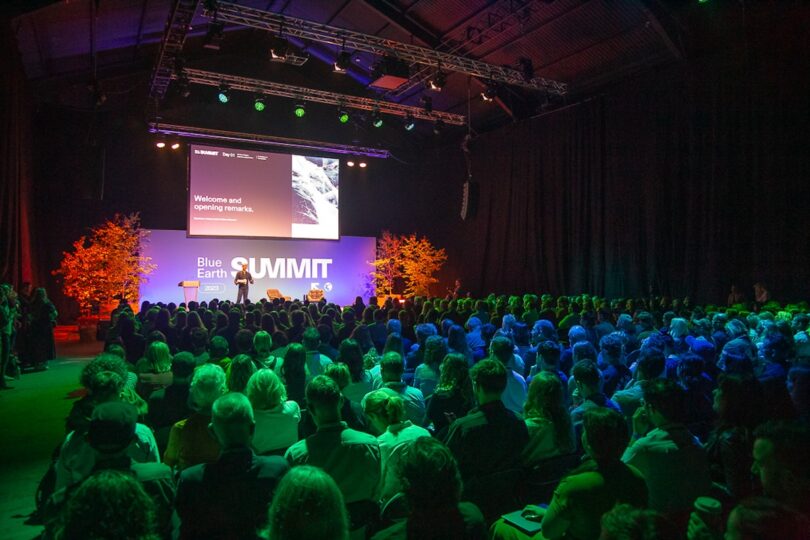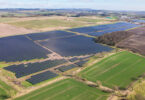We enjoyed talking to Ben Goldsmith, one of Britain’s most passionate environmental advocates, who has a passion for rewilding and working with nature. A firm believer that the environment should cross the traditional political divides, Ben’s philanthropy and work to place green issues at the heart of finance is changing attitudes and bringing people together.
As the founder and chair of the Conservation Collective, which links local environmental foundations, Ben is a speaker at the Blue Earth Summit and a trustee of the Children’s Investment Fund Foundation (CIFF), a philanthropic fund targeting climate change. He even finds time for a Rewilding the World podcast.

Ben Goldsmith
With political experience serving as a Non-Executive Director of the UK Government’s Department of Food, Environment and Rural Affairs, Ben knows how to bring the environment into politics and the world of finance. Now, he is a proud hustler for nature, making sure that green issues never slide down the political agenda.
Could you tell us more about yourself and how you became such an outspoken and passionate advocate of the environment?
I grew up with and was fascinated by the frogs that we found underneath logs in the garden. And, I was interested in putting up bird boxes and got up very early each morning to try and see fox cubs or hedgehogs. I was just obsessed and passionate about wildlife.
It dawned on me, as I got a little older, that in Britain, we don’t have much of our wildlife left. Now, we’ve lost our golden eagles in the south of England, we’ve lost our wild boar, our beavers, our bears, our wolves, and all manner of species.
So, I was very interested, from an early age, in the idea of bringing wild animals back to Britain and Europe. That was always my kind of passionate interest. And, as I became an adult, and especially during the last 20 years or so, I’ve tried to use whatever levers are at my disposal, whatever connections I might have and whatever positions I’ve ended up in, to try to advance the cause of nature recovery.
I just try to be an effective hustler for nature. Nature needs hustlers!
You talk about rewilding with passion. What rewilding policies and programmes would you like to see more of in the UK?
Look, I think the most important thing that’s happened already, by far, something which was beyond our wildest dreams, maybe a decade ago, was the linking of environment and agricultural subsidies to support stewardship and restoration of nature. England is doing something truly pioneering, something that no other developed nation has done in rolling out its environmental land management scheme.
The scheme dictates that every pound of public money handed out to people who own and manage land is conditional upon the restoration of soil, watercourses, pollinating insects, habitats, and nature. Now, that’s something that’s never been done before in the world, and I think we already can see the change.
It’s a seven-year transition period and we’re only five years in. Already if you travel on the train north, south, east, or west in England, you can already see rougher edges and patches of set-aside. You can see rougher, wilder riparian habitats along our watercourses. I think that the replacement of agricultural subsidies with stewardship payments would always have been my aim.
I dream now that we get it right in this country, and then it’s copied not just across the UK, because Scotland, Wales, and Northern Ireland are way behind us, but also in the European Union and America. I think this is the great opportunity because most of the land is farmed, and most of that is farmed very unproductively and unprofitably. The incentives are skewed, at the moment, by public money.
If you shift the public money so that it has an emphasis on stewardship and restoration, the overwhelming majority of land managers will really have no choice but to do things better for nature. In terms of things that haven’t yet happened, I’d like to see the country make it much easier to reintroduce missing species locally and nationally. There’s just so much red tape and bureaucracy that seems designed to impede reintroduction efforts.
Now, I think there is a bit of Machiavellian plotting that takes place behind the scenes in which various vested interests use their influence within government to hamstring efforts to bring back everything from harvest mice in Norfolk or pool frogs to the Somerset levels, all the way up to Eurasian lynx and hopefully, before too long, wolves. We need these species back and I’d like to see a much more proactive and ambitious approach to species reintroduction in this country.
Politics is highly partisan, but you believe that these environmental issues cut across political boundaries. How do we continue to bring people together across the political spectrum?
Well, the UK has been in the fortunate position, at least during much of the last decade or so, of having bipartisan agreement around the science of climate change and the need to tackle it and fix nature.
The Climate Act was passed in 2008 with massive bipartisan support in the House of Parliament. And similarly, the various pieces of legislation that have followed: the 25-year environment plan was given legal underpinning by the Environment Act 2021, the Agriculture Act 2020, the Fisheries Act, and the creation of a new Office for Environmental Protection. Now, all of these things have happened because there’s been a general consensus between left and right on climate and environment.
Maybe we’ve gone backwards in the last couple of years. I think it’s unhelpful some of the rhetoric that came out of Rishi Sunak’s government on these issues. I think they were playing to an audience that I don’t believe exists.
I think it’s quite a fringe slice of the electorate that doesn’t believe that these things matter and that doesn’t want to live in a cleaner, greener, more vibrant world that isn’t affected by climate change. So I don’t know exactly what Rishi Sunak was trying to achieve, but it didn’t work, that’s for sure. And it may have set the country back a little bit in terms of bipartisanship on climate and environment.
So, I think what’s really important are the Conservative Environment Network, which I co-founded and chair, and on the Labour side, the Labour Climate and Environment Forum. These initiatives that sit within, even though they’re both legally separate, the Conservative and Labour political movements, are very, very important voices for ambitious climate and environment action. So, these are two of the most important environmental NGOs in the country for maintaining this bipartisan approach to climate and environmental issues.
But now, we’re going to see a battle for the soul of the Conservative Party, and it could go either way on our issues. That’s why Conservative Environment Network is so very important at this time. Labour has got really good climate policies and, for the first time ever, they seem to be taking nature seriously as well, probably as a response to the public fury over pollution of our rivers that has been a big political issue in the last two or three years.
Labour has never historically managed to convince voters that it’s the party of nature, and I’m hoping that that will change with this administration.
Finding the balance between the environment and rural ways of life is sometimes difficult so, how do you persuade the farming communities to buy into your ideas?
I think the obstacles are not economic. The incentives are now much better aligned with a nature-friendly way of farming. The problem is that those who would have us maintain the status quo, and those who tell us that net zero is a madness, have co-opted sections of the farming community by frightening them with the suggestion that nature-friendly farming and wilder approaches to farming in our national parks are a new round of landscape clearances.
They claim they’re a new effort to drive people from the land, to deprive them of their livelihoods and their traditions. And they’ve done this quite effectively, and I think it’s entirely sinister the way they’ve approached it and the way they’ve co-opted sections of the farming community with this messaging. So, this idea of nature-friendly farming risks being dragged into a culture war where we see the farmer protests and so on.
It’s nonsense to suggest that nature stewardship and farming and culture don’t go hand in hand. Now, I think that if you went to the Lake District National Park 150 years ago, yes, you’d have found sheep: mainly the kind of speciality breed sheep in relatively modest numbers, and people would have been very proud of them, but the numbers were drastically lower than what we see today. And the predominant way of farming in our upland landscapes was with native cattle.
You’d have had these lovely, vast, mosaic, dynamic wood pastures grazed with native cattle turned loose and some pigs. They had a practise called pannage, where they ran pigs at certain times of the year among the oak trees to eat the acorns. And I think that what we need is we need to draw inspiration from those wilder ways of farming in landscapes that really don’t make a dent in our national food production, where it’s all about culture.
We want farmers to farm in a gentler, more traditional way, such that we get nature recovery hand in hand with continued farming and farming culture. That’s the message that we need to deliver if we’re to outmanoeuvre this attempted culture war. I think a just transition is very doable in these landscapes.
After Brexit and the withdrawal from the CAP and the common fisheries policy, how do you think that subsidies for farming and fishing can support greener policies?
Well, I think we’re in a really good place on farm subsidies in England. On fishing, thankfully, most of the developed nations in the world have significantly reduced their capacity subsidies for fishing. The World Trade Organisation brokered a deal, and subsidies seem to be phased out in most places. The Chinese still heavily subsidise their fleets in an unsustainable way, and there are other nations that do the same.
But in the UK, we don’t subsidise in the way that we used to. And fishing is becoming more sustainable in British waters, not least because we’re no longer bound up in the common fisheries policy of the European Union, which has been disastrous. I mean, the European Union is very bad on fisheries.
Look at the fact that we’ve banned bottom trawling in some of our marine protected areas. I think that’s only four or five of them out of 30 or so. And we’re being subjected to a barrage by the European Union for having done that even though it’s so obviously the right thing to do. We’ve also banned the fishing of sand eels, which is an essential component of the food web in the North Sea and in British waters, and is really the key to saving our seabird populations, which are globally important and are declining: puffins, for example.
And we’re being taken to court by a bunch of EU states for having done that. So, the European Union is very backward on fishing policy, and it’s one of the silver linings of Brexit. No matter whether people voted leave or remain, they tend to agree that we have got a shot at managing our seas far better outside of the European Union than we did inside.
I’d like to see continued banning of bottom trawling in our marine protected areas, and I think everywhere. I’d like to see sustainable fishing methods deployed to catch fish according to quotas that are set within scientifically laid down parameters. And I’d like to see no take zones in which there’s no fishing at all.
If we do those things, we will get dramatic recovery in our seas. And again, as we’re doing in farming, I think we lay down a template for other countries to follow.
You’ve been very frank about the influence of industry lobbyists on government policy in DEFRA. How can we push back against this?
Well, it’s specifically the three Fs. It’s farming, fishing, and forestry. You know, I think farming, fishing and forestry, among all the major industrial sectors, are the most backwards when it comes to embracing change and leading efforts towards a more nature friendly future. They want to maintain their subsidies. They want to minimise or dodge regulation. They want to have a kind of free for all, which is what they’ve been used to for decades.
And, I think that the influence of fishing and farming in particular is so powerful because of the way they are perceived by the public. We grow up reading children’s books that depict farms as very happy places, and the farmer’s wife scattering corn in the farmyard for the friendly chickens and the happy animals peeking over the fence.
We don’t think of factory farms when we think of farming. We don’t think of industrial farming. We don’t think of the environmental destruction that goes hand in hand with modern farming methods. Similarly, we don’t think of fishing as being factory ships that can catch 250,000 tonnes in a single go.
Instead of these vast multinational ships, we think of Captain Birdseye with yellow oil skins and a lovely white beard going back to the little fishing community on the coast. Well, those kinds of Captain Birdseye fishing boats with the happy captain and the wife on the shore in her overalls catch about four or five percent of our quota. Most of the quota goes to the multinational owned factory ships.
There’s a public perception of these industries, which is very heartfelt and it feels very wrapped up in who we believe we are in our identity and our culture. The politicians and officials are very nervous to be on the wrong side of PR, which says that they are anti-fishing or anti-farming.
They’ve benefited from a very strong position as far as their ability to lobby government goes. But that may be changing. The social contract with both of those industrial sectors is changing and the financial incentives, as we’ve discussed, have also been changed. There’s a very good opportunity now to put those industries on a different footing in terms of their relationship with the natural world and the sustainability within which they operate.
Looking a bit more into your financial side of your work, green finance and sustainable investment are a part of tackling many environmental issues. Do you think that investors and companies are becoming more open to the idea?
I think that it’s pretty clear to all the investors I can think of that investing in companies which are actively destroying nature is not a winner in a financial sense. There is a growing body of regulation, taxation, trade barriers, consumer pressure, problems with borrowing money from banks, and with hiring decent staff if you are a company that trashes nature. For financial risk reasons, companies are now upping their game and those that aren’t are falling behind. There’s a very clear investment rationale now for investing in companies which are responsible in the way they interact with the natural world.
There’s a long way to go but that shift, I think, is inexorable now and inevitable. And a growing number of investors are looking to figure out how they can actively deploy their capital into asset classes which move us into a better place.
Renewable energy, for example, is now one of the biggest categories of infrastructure investment, as an absolutely mainstream asset class. Lots of investors are starting to invest in natural capital, which is investor speak for nature restoration. There are lots of scenarios in which, if you recover nature, you deliver outcomes that are worth money, such as mitigation of flooding, storing and cleaning water, or rebuilding soils or sequestering carbon.
These things are worth something to someone, to society as a whole or to particular special interests like water companies or insurance companies. And those interests are willing to pay for them. The emerging asset class of natural capital is very, very interesting because there isn’t enough public money or philanthropic money to rebuild nature.
We need investors to step up. But investors obviously have responsibility to their own stakeholders. If you’re a pension fund manager, you have to produce income because your pensioners rely on that income. So, if natural capital or nature restoration can deliver you an income, then suddenly a whole new asset class is open to you, which improves the world whilst making money.
We’re living in very exciting times that people are investing less and less in the bad and are figuring out more and more how to invest in the good. There’s building on the renewable energy to a certain extent.
With Menhaden Resource Efficiency, you promote the efficient use of energy resources. How do you achieve this and what do you think are the biggest benefits for the environment?
So, I’m involved in two investment companies. I’m chief executive of Menhaden, which is a London listed investment trust that invests in quite a conventional way. It’s a pretty typical multi-asset investment company with ordinary shareholders, which has an ESG and climate slant to it. And, we are very mindful about environmental considerations in the way we deploy our money.
Our investments are pretty mainstream, so we would fall into that first category of companies which are actively looking to minimise the harm they do through their investments. I am involved in a second investment company called Nattergal. It’s a Danish for Nightingale and we’ve raised £40 million in a Series A equity financing. We are investing in natural capital so we’re looking for places where we can restore nature at a landscape scale and generate a return for our investors in doing that.
I think that’s a really, really exciting project and, if we can pull it off, we can contribute to the movement that is turning nature into something investable for mainstream investors.
For the final question, what you would like to see happen in the future? What are the biggest environmental challenges we still face? What policies do you believe could tackle them?
I’m pretty optimistic that we are decarbonising faster than we thought we would be and that we will get it done on the basis that the technology is just cheaper, better, and faster than the fossil fuel incumbency: I’m a kind of decarbonisation optimist! I’m not sure there’s much point being a decarbonisation pessimist, but I do believe that we are decarbonising faster than we imagined we would be. The UK emissions now are at their lowest level since about 1875.
Now our emissions are down 60% on 1990 levels, we’re making pretty good progress and other countries are as well. I think the greatest challenge is in, reinserting our human systems into natural ones, you know, in putting ourselves back into the miracle of nature rather than considering ourselves to be outside of it and able to raid it and exploit it as at will.
The challenge is how do we reinsert ourselves back into nature in every possible sense? Because, I think unless we rediscover our place within nature and fulfil our kind of God-given role as stewards of nature, then I think it doesn’t matter how much decarbonising we do. I think the world will die around us and will no longer support us. We’ve got to talk a lot more about nature and our impact on it.
The key to that is for people to understand what nature is. The moment people see Augusta golf course, or the utterly overgrazed and denuded Highlands of Scotland, or the sheep monocultures of Dartmoor, they think it’s nature but it’s not; it’s the skeleton of nature. We need people to understand what vibrant nature that thrums with life is meant to feel like and meant to look like, then they will yearn for it.
Then, we need to design systems so that we can recreate that vibrant nature and live within it.
Find Ben at the Blue Earth Summit
Blue Earth Summit takes place between 16 and 18 October and you can book tickets here.
Ben Goldsmith will join a panel of nature expert speakers including Tim Smit, Founder of The Eden Project, Will Travers OBE, Co-Founder of the Born Free Foundation and Beccy Speight CEO, RSPB.
Related articles:
Europe’s leading event for mission led business is back for 2024 Blue Earth Summit lands in London







